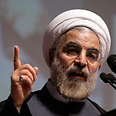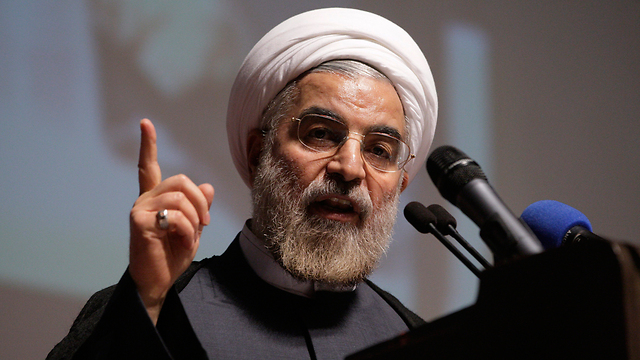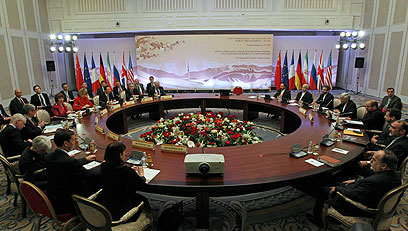
Think tank: US should stop sanctions, hold direct talks with Iran
Report by International Crisis Group says US should not expect Rohani to make concessions, but should lay off sanctions, begin direct, confidential talks
The United States should hold confidential direct talks with Iran over its nuclear program but the West should not expect Iran's moderate new president to offer major concessions, a prominent think-tank said on Tuesday.
To try to give the talks a chance, however, Washington and other world powers should hold off imposing new sanctions on Iran, the International Crisis Group (ICG) said in a report.
Related stories:
- Iran: Rohani forms cabinet, appoints female VP
- Rohani: Iran prepared for negotiations on nuclear issue
- Report: Zimbabwe agrees to sell uranium to Iran
The United States and other powers suspect the Islamic Republic is covertly seeking a nuclear arms capability. Israel has threatened military action to prevent Iran from acquiring nuclear bombs. Iran says it seeks only civilian nuclear energy.

Do not expect Rohani to make concessions (Photo: AP)
The Islamic Republic and six world powers - Britain, China, France, Germany, Russia and the United States, collectively dubbed the P5+1 - have held several rounds of talks but have yet to even approach a breakthrough.
The last meeting was in April and all sides have said they want to restart negotiations as soon as possible.
But Washington should also set up a "direct, confidential" channel with Iran to complement negotiations with the P5+1 powers, the ICG said, and the talks also ought to encompass regional security issues other than the nuclear program.

Last round of nuclear talks. Kazakhstan (Photo: AP)
"The P5+1, with its complex internal dynamics and its members' competing interests, is a cumbersome mechanism for conducting negotiations, which require real bargaining, not staged committee discussions," said Ali Vaez, senior Iran analyst at International Crisis Group.
"If a political solution is hammered out between Tehran and Washington, all other members of the P5+1 are likely to accept it, even if grudgingly."
The two countries have had no official ties since 1980 after Iranian students occupied the US embassy in Tehran, taking 52 diplomats hostage in protest against Washington's admission of the former Shah after he was toppled by the Islamic revolution.
President Hassan Rohani, who took office on Aug. 3 after an election landslide, has said he is not opposed to direct talks with the United States, though Supreme Leader Ayatollah Ali Khamenei would ultimately decide on any direct negotiations.
The West should however temper any expectations of a rapid breakthrough with Iran because Rohani will probably avoid offering significant concessions on the scope of the program, according to the ICG.
Rohani, a mid-ranking cleric who trounced more conservative rivals in a June 14 election, has promised moderation in Iran's domestic and foreign policies and more transparency in its nuclear program.
But like all Iranian officials, Rohani, an ex-chief nuclear negotiator, also insists on a recognition of Iran's "right" to enrich uranium for nuclear power - a process that can yield energy or nuclear weapons, depending on the degree of refinement.
Iran says its nuclear activity has medical applications and will produce energy to meet domestic demand. Khamenei, and not the president, ultimately controls the nuclear file.
As Iran's nuclear negotiator from 2003 to 2005, Rohani saw through an agreement to suspend Iran's uranium enrichment. That deal, scrapped after hardline president Mahmoud Ahmadinejad's 2005 election, made him a target for conservative rivals during the presidential campaign this year. They said he had ceded Iran's interests in return for nothing of equal value.
That history means Rohani will be reluctant to take steps to suspend enrichment again, the ICG said, opting instead for greater transparency long demanded by the UN nuclear watchdog.
"His negotiating experience ... carries mixed messages: that he feels the West let him down, causing him to suffer bitter criticism at home, may well prompt him to greater caution," the International Crisis Group said.
Not time for sanctions
The United States and its allies have demanded Iran curb its enrichment of uranium and have meted out increasingly tough sanctions on Iran's energy, banking and shipping sectors, slashing Iranian oil exports by half since 2011.
A large majority of US senators urged President Barack Obama in a letter this month to step up sanctions to strengthen Washington's hand in talks. The House of Representatives also passed a bill meant to choke off Iranian oil exports altogether. The Senate is due to debate the bill after the summer recess.
But to give diplomacy the greatest chance of success, the ICG said, "now is not the time to ramp up sanctions". Such a move would undercut efforts by Rohani's team to be flexible in negotiations, the ICG cautioned.
"More pressure will be a godsend to hardliners, vindicating their anti-Western narrative while eliminating Rohani's maneuvering room," the report quoted Abbas Maleki, a former Iranian deputy foreign minister, as saying.
Despite the obstacles, both sides should embrace the opportunity for a new approach to the nuclear crisis, ICG said.
"The promise embodied by Rohani's election can grow or quickly fizzle. As he takes office and comes face to face with myriad domestic and foreign challenges, it would be a good idea for the West to encourage him to move in the right direction."
- Receive Ynetnews updates directly to your desktop










